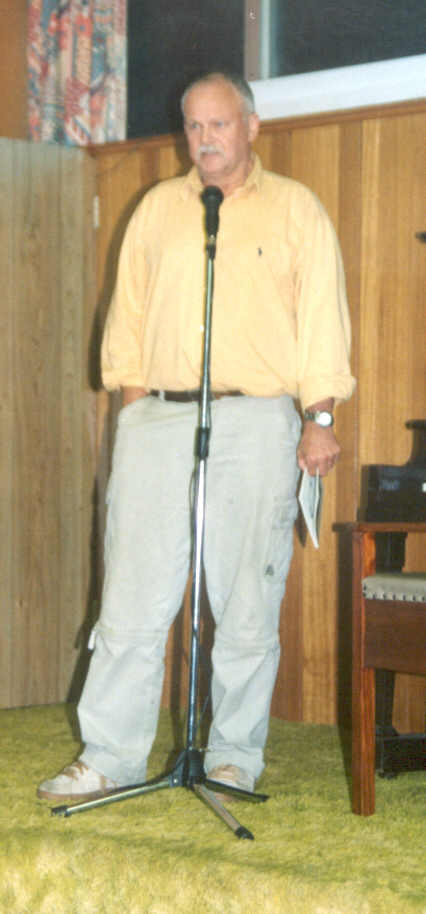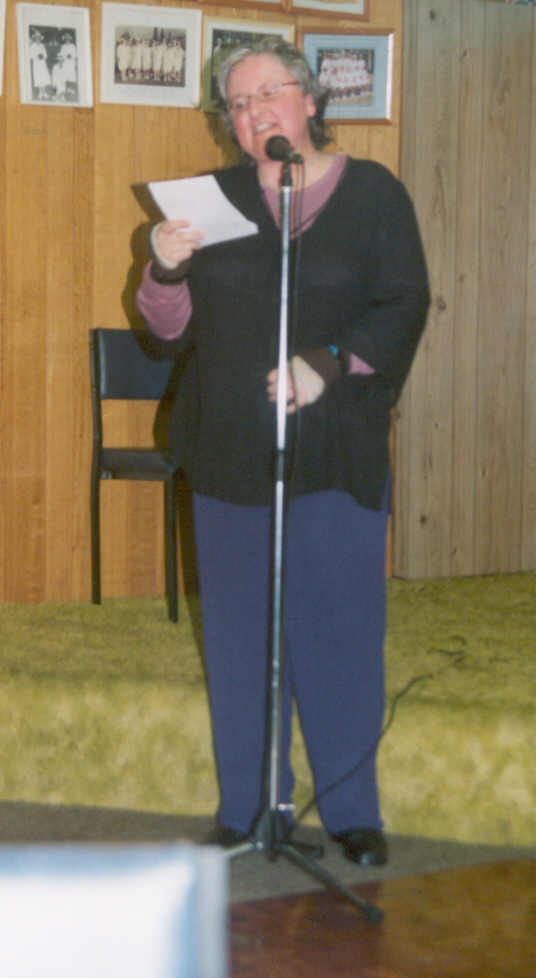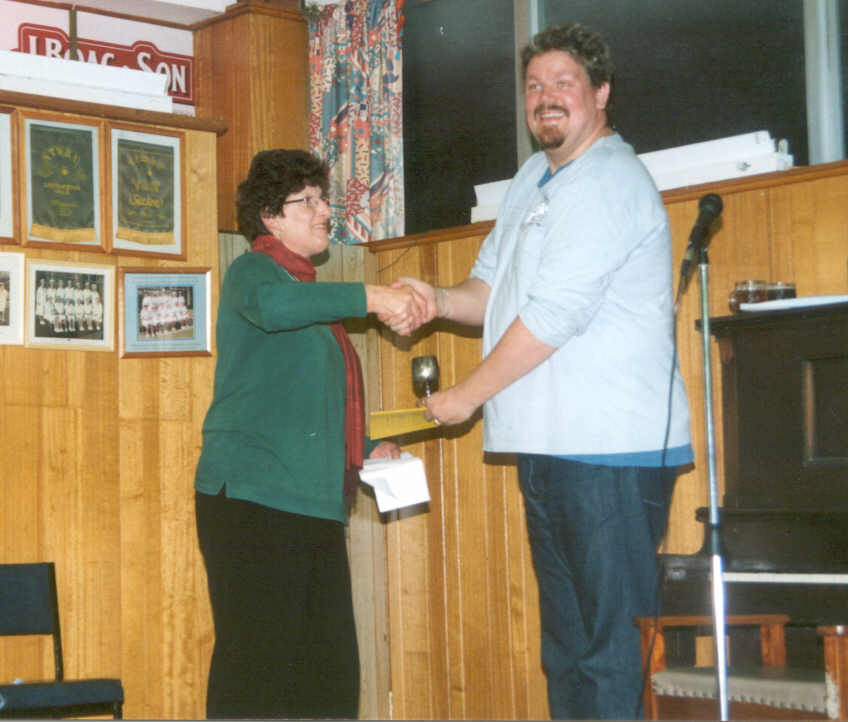RALPH WESSMAN
Tasmanian Poetry Festival 2005
- Sunday, 16th October, 2005.
- A few thoughts on last night's festival proceedings.
A late start – half an hour at least, maybe that’s the way these things go – before New Zealand poet Ron Riddell, backed by Jules Witek on bongo, takes the microphone. Riddell and Lauren Williams – I don’t have a programme guide in front of me, but I guess the theme is writing in translation - perform most of their work in Spanish throughout this bracket. The drift of their words escape me, but not Riddell's vitality. He rocks back and forth on his heels, leans forward into his poems in the manner of Winslet and DiCaprio on Titanic's bow. Both refer repeatedly to the international poetry festival in Medellin, Columbia, where Williams has twice been a guest. The first experience so impressed her that when she returned to Australia she determined to learn to speak Spanish. On being invited back to the festival seven years later she was able to read in a mix of Spanish and English.
'I'd found the experience of listening to poetry in Spanish, just wonderful - but frustrating too,' says Lauren Williams. 'I couldn't understand the words but could see from the expressions on the faces of other guests that this was something good, that I was in the presence of some great poetry being read - and I couldn't understand a word. It came to a climax for me when I was asked which poem from my work I'd like read to the audience - in Spanish - and, when I pointed to one beginning
Lust comes to visit
knocks on the door
the response was deadpan. I thought, this can't be right! What's happening, what are they hearing? ... It turns out the programme translation mistakenly assumed 'Lust' to be a person's name, and the audience was listening to the equivalent of
Jason comes to visit
knocks on the door
so no wonder there was no response. They were thinking, who is this woman? I turned to the translater and demanded to present a poem myself - a rap poem - cos that crosses any language barrier, it's rhythmic - and this saved my ass big time!'
Following the session, Louise Oxley launches Pete Hay's collection, Silently on the Tide. Her summation draws frank appreciation from Hay. 'Louise has managed to get to the heart of what I intended - particularly with a poem such as 'Back Town Dying' - better than I could readily manage myself.' Hay proceeds to read from 'Back Town Dying', set in north-west Tasmania. 'I thought the only people in the world interested in this poem would be myself and Barney Roberts,' Hay says, 'but I've read it on other occasions and had a good response so I'll try it again.' Reading from another of his longer poems, 'In Memory of William Paterson', Hay admits to it sounding a bit 'Death of a River Guide-ish'. 'But I'll have you know I had the idea for this poem long before Richard Flanagan was in shorts'.
Pete Hay
- Hay takes time out to lament the loss of his friend Barney Roberts - the author of ten books and the winner of the NSW Premiers' Literary Award (Special Peace Prize, International Year of Peace, 1986) and one of Tasmania's favourite literary sons - who'd suffered a massive stroke earlier in the week. 'Two days ago the Robert Frost of Tasmanian poetry passed away, and we'll miss him very much. His last collection of Horrie poems, I'm sure, will one day become the classic I believe it to be. Barney leaves a very big hole in Tasmanian poetry.'
- Following Hay, it's time for the Poetry Cup. Entrants are judged on sixty seconds of verse with the winner being the poet receiving the most decibels of applause. 'If you read for longer than a minute you'll be gonged by the sound of the asthmatic goose,' warns compere Cameron Hindrum. There's plenty of stiff competition between the locals and interstate/international visitors (Ian McBryde, Susan Kruss, Julie Beveridge, Williams & Riddell) for the cup that's been donated by Colin Berry. ('He was obliged to do that,' the compere chips in, 'being the only person to win the Cup twice in different millenia in its twenty year history'). Susan Kruss is unfortunate enough to be chosen to read first. 'I'm playing with my villanelle,' she recites, though really her poem has more to do with the individual's sex drive than to villanelles. Tim Thorne reads next, and though from constant rehearsal he knows full well that his poem easily comes in under a minute, 'I was enjoying the response to the lines so much I lost track' ... and is gonged. He carries on anyway, and is disqualified.
- Carolyn Fisher and Robyn Mathison
Robyn Mathison begins slowly, 'A starling/ crashed into my left breast/ a kamikaze bird...' The audience listens respectfully, only to be surprised & delighted when Robyn veers off on a tangent. The bird recovered, '... flew off/ in the direction of Mather's Lane./ Good idea, I thought/ she's going to the Catholic Womens' Rest Rooms/ for a nice cup of tea'. Robyn draws sustained and appreciative applause, almost steals the show. Ron Riddell comes on to read, and is all over the floor, he's very acrobatic - 'don't smoke don't smoke don't smoke'. By contrast, Ian McBryde in minimalist mode is stoicly stony-faced. 'This is a poem about every writer's major frustration, it's called writer's block.' McBryde lapses into silence. After twenty seconds or so, an audience member snickers. 'I'm not finished yet,' McBryde admonishs, but thanks the audience a little later and retires from the stage.
- 'He's got a way with words, hasn't he?' adlibs Hindrum.
Bruce Penn is called to the microphone. 'This is called "The Core Promises Prayer" ', he intones.
- Our feather which floats in Canberra
- Howard be thy name
- Thy kingdom come undone
- Thy will won't on my patch of dirt
- As it does in Washington
- Give us this day our daily crumbs
- And forgive us our expatriates
- As we forgive them that take refuge amongst us.
- Lead us not into war coalitions
- And deliver us from politicians.
- For thine is the razor wire
- Channel nine the power and the story
- For never and ever
- (I did not have political relations with that man)
- Arrrrrghh. Men!
- The buzzer sounds just as Penn mouths 'Arrrrrghh. Men!'
- 'Is your timing always that good?' asks Hindrum.
(Liz Winfield, Karen Knight)
- Next it's Colin Berry's turn. 'Can he win the cup three times? You'd never hear the end of it, I assure you!' Hindrum ventures.
- Berry didn't. In the end the award went to Hobart poet Jenny Barnard, who went through the ritual of repeating the performance before asking the compere for a hug. 'That's the first time I've ever had to stand on tip toe to hug a man,' she said. 'Never had to bend over before,' came Hindrum's reply.
- Tasmanian Poetry Cup winner Jenny Barnard congratulated by compere Cameron Hindrum
MEAT - OUT (by Jenny Barnard)
- Chew on that!
gristly, stringy,
chuck steak.
Toss in some
haricot beans, tomato paste
onions, carrots, celery
bib & bobs
from last week's fridge.
So good for you
so beef stew
climb in the pot- it's hot -
- soooo what!
Doc said don't eat red meat -
I ate red lentils, green lentils, brown lentils,- yellow beans, fava beans, mother beans,
forty three beans.- I kicked the brie
shot the salt shaker- killed the soy sauce
gave the mince to the rottweiller.- too many additives,
- fucked liver?
- I felt pretty, o so pretty
- so chicken thin.
- 'You dyin darlin?'
- I pant, I puff, I yawn,
but I'm eating healthy - I'm so healthy- O so healthy I can't breathe -
my heart stops and starts like Phar Lap
on the last stretch of turf.- Go back to the herbalist.
'Ah, you need a blood test.
You're iron deficient.
Here's some ampoules
& syringes - go inject yourself!'



